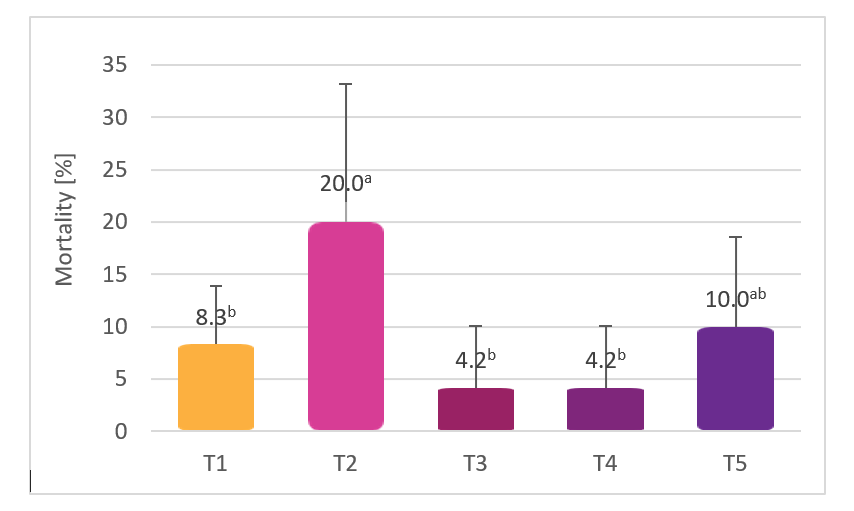



The signs of E. coli and effectiveness of bacteriophage treatment
Study proves reduction in mortality and improvement of performance (short version)Colibacillosis, an infectious disease caused by the bacterium Escherichia coli, has become worrying issue in poultry flocks worldwide. Avian pathogenic Escherichia coli (APEC) infection is considered as one of the principal causes of morbidity and mortality, associated with heavy economic losses to the poultry industry.
The first symptoms of the respiratory tract infection may be difficulty in breathing, nasal discharges, sneezing. After necropsy the observations usually are swollen kidney, reddish lungs, thin whitish layer over liver and heart.
The disease is often in laying hens, yolk sac infections are frequently observed towards the end of the egg incubating period, usually following faecal contamination of the egg surface. Diarrhoea, loose and wet droppings or undigested feed in litter may be another indicator of APEC infection.
Colibacillosis is enhanced by insufficient farm hygiene or unfavourable housing conditions, but it may be also spread by rodents or insects.
Multidrug resistance in Escherichia coli has become a fact, that is increasingly observed in veterinary medicine but also in human worldwide. Very alarming is also the fact that use of a particular antibiotic can also cause the resistance to other antibiotics from the same class.
Prevention is the best way to protect the flock from colibacillosis. Applying favourable conditions for birds and reducing stress to minimum is always in corelation to general birds’ well-being and disease resistance. The pathogenic bacteria colonization can be prevented by controlling environmental contamination in order to avoid predisposing respiratory infections. Application of probiotics to competitively exclude pathogens from intestinal tract are one method. Other preventive methods include the reduction of the transmission of E. coli to newly hatched birds, by fumigating the eggs within 2 h after they have been laid and by discarding eggs that are cracked or those with obvious faecal contamination.
However, more and more popular becomes the application of bacteriophages as a powerful addition to conventional methods. Bacteriophages are natural particles and are recognized as the most abundant biological agent on earth. BAFACOL™ is a bacteriophage cocktail that is specific to avian pathogenic Escherichia coli. It has been proved to have high efficacy with no side effects observed. It is safe to use with other antibacterial, feed additives and vaccines.
BAFACOL™ bacteriophage cocktail
BAFACOL™ produced by Proteon Pharmaceuticals SA (Poland) is a phage-based feed additive providing protection from APEC for all avian species. It is added to the drinking water, and 1L contains 100K doses (0,01ml per bird). In the described experiment two administration schemes were tested: the recommended for broiler chickens, which is every second day for the whole life cycle, and everyday administration for the first two weeks only.
Table 1: Experimental groups description
|
Group ID |
Infection |
Antibiotic |
Feed additive |
|
T1 |
No |
No |
No |
|
T2 |
With APEC on day 5 |
No |
No |
|
T3 |
With APEC on day 5 |
No |
BAFACOL™ days 0-35, every other day |
|
T4 |
With APEC on day 5 |
No |
BAFACOL™ days 0-14, every day |
|
T5 |
With APEC on day 5 |
Enrofloxacin days 9-13 |
No |
Discussion
Conventional methods like antibiotic treatment of disease outbreak are costly, and due to emerging problem of antibiotic resistance, not always efficient. This may also cause risk to humans through the consumption of contaminated meat. The presented study shows that bacteriophages are a great tool for modern farms, that want not only prevent the APEC infection among their flocks but also care about sustainability.

The tested feed additive BAFACOL™ administered to birds infected with APEC strains every other day for the whole cycle and every day up to the 14th day of rearing caused a significant reduction in mortality compared to the positive control group, which indicates that it is effective in the prevention of colibacillosis.
Moreover, birds receiving BAFACOL™ for the whole cycle showed better results than birds from negative and significantly better results than positive control groups in terms of mean body weight, average daily weight gain, average daily feed intake and EPEF. The mean body weight and FCR in group receiving BAFACOL™ for first two weeks were like values obtained for non-infected control group and better than for infected control group. The average daily weight gain, average daily feed intake, mortality, EPEF in group receiving BAFACOL™ for first two weeks were similar or better to values obtained for non-infected control group and significantly better than for infected control group.
Bacteriophage feed additive also ranks better when compared with antibiotic treatment. The study showed lower mortality in groups receiving BAFACOL™ than in group treated with enrofloxacin. Birds in groups T3 and T4 receiving BAFACOL™ achieved better main performance parameters (mean body weight, average daily weight gain, average daily feed intake, mortality, FCR and EPEF ( FCR and EPEF significantly better in T3 group)) than broilers treated with enrofloxacin.
Immunological parameters prove the efficiency of BAFACOL™ in limiting E. coli infection. High LPS level in serum of infected chickens may indicate systemic infection development. Significantly lower LPS level in BAFACOL™ groups T3, T4, (not significantly different from T1 negative control) suggests no systemic infection in those groups. LPS level in enrofloxacin treated group comparable to positive control shows significantly lower efficiency of the antibiotic against E. coli. For proinflammatory cytokines – IFN-γ and IL-6 – the highest expression was observed in group T3 (BAFACOL™, E. coli) which, together with the mortality and performance results, indicates more efficient immune response towards the pathogen. The regulatory TGF-β4 cytokine expression in T3 group was lower than the level in T1 group but higher than T2 positive control. The role of this cytokine is complex and low level of expression may suggest the difficulties in controlling exaggerated immune response as well as the lack of suppression of other cytokines.
BAFACOLTM is an innovative bacteriophage-based feed additive that was proved by this study to prevent Avian Pathogenic E. coli in poultry. BAFACOL™ enables to reduce the use of standard antibiotics, thus contributing to overall reduction in antibiotic resistance to antibiotics used in poultry meat production. By using BAFACOL™ feed additive farmers may contribute to removing antibiotics from the food chain, thus making animal protein production more sustainable and healthy. At the same time the flock is protected from the disease and the production is more efficient. Bacteriophages support the natural immune system of livestock through ensuring a healthy and well-balanced microbiome. Taking good care of the livestock, prevention of diseases, application of natural, efficient solutions, organic farming are more and more important to consumers nowadays. Bacteriophages, and BAFACOL™ product in particular, are great tool supporting this trend.









